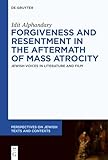Forgiveness and Resentment in the Aftermath of Mass Atrocity : Jewish Voices in Literature and Film / Idit Alphandary.
Material type: TextSeries: Perspectives on Jewish Texts and Contexts ; 24Publisher: Berlin ; Boston : De Gruyter, [2023]Copyright date: ©2024Description: 1 online resource (IX, 217 p.)Content type:
TextSeries: Perspectives on Jewish Texts and Contexts ; 24Publisher: Berlin ; Boston : De Gruyter, [2023]Copyright date: ©2024Description: 1 online resource (IX, 217 p.)Content type: - 9783111242330
- 9783111317816
- 9783111317694
- 150.1952
- online - DeGruyter
- Issued also in print.
| Item type | Current library | Call number | URL | Status | Notes | Barcode | |
|---|---|---|---|---|---|---|---|
 eBook
eBook
|
Biblioteca "Angelicum" Pont. Univ. S.Tommaso d'Aquino Nuvola online | online - DeGruyter (Browse shelf(Opens below)) | Online access | Not for loan (Accesso limitato) | Accesso per gli utenti autorizzati / Access for authorized users | (dgr)9783111317694 |
Frontmatter -- Acknowledgements -- Contents -- List of figures -- Introduction Theorizing forgiveness and resentment in the presence of radical evil -- Chapter 1 Forgiveness, resentment and reconciliation – on W. G. Sebald -- Interchapter 1 Aesthetic falsehood and emotion – on Bruno Schulz’s The Sanatorium Under the Hourglass and Wojciech Has’s The Hourglass Sanatorium -- Chapter 2 Love and worldliness – on Hannah Arendt -- Interchapter 2 The necessary fragility of paradox – on Christian Petzold’s Phoenix -- Chapter 3 The sincerity of forgiveness – on Heinrich Böll and Jean Améry -- Interchapter 3 Negative possessions – on Wladislaw Pasikowski’s Aftermath (Poklosie) -- Chapter 4 From emotion to national renewal – on J.M. Coetzee -- Interchapter 4 Memory and nonviolence – on Raoul Peck’s I Am Not Your Negro -- Coda Forgiveness, justice, and historical responsibility -- Bibliography -- Index
restricted access online access with authorization star
http://purl.org/coar/access_right/c_16ec
The author's starting point is the interweaving of forgiveness and resentment in the works of Jewish writers after the Holocaust, most especially Hannah Arendt and Jean Améry, to make sense of the catastrophe and to point to a way forward for both victims and perpetrators. The insights of these two writers and of several Jewish novelists and poets, including Bruno Schulz, Paul Celan, and Aharon Appelfeld, are used to develop accounts of forgiveness and resentment in other cases of mass atrocity around the world. The author offers a critical rereading of primary sources that aim to separate resentment from nonviolent resistance, and forgiveness from reconciliation. Forgiveness and resentment are not, as they might first appear, mutually exclusive. Together with Arendt, Améry, and Walter Benjamin, it is argued that it is through the interaction between them that victims of mass atrocity become agents of personal and cultural change. Together, forgiveness and resentment interrupt the present, reframe the past, and shape the future. They can reduce the chasm that separates memory and trust by fashioning new connections between identity and alterity, which can open paths to truly ethical coexistence for victims and perpetrators, and their descendants.
Issued also in print.
Mode of access: Internet via World Wide Web.
In English.
Description based on online resource; title from PDF title page (publisher's Web site, viewed 06. Mrz 2024)


